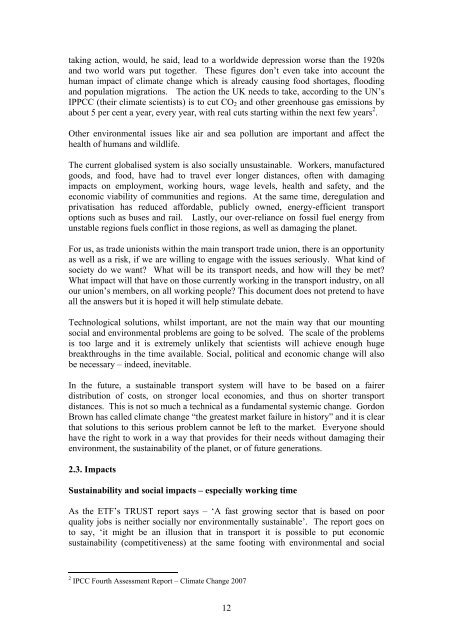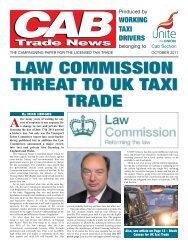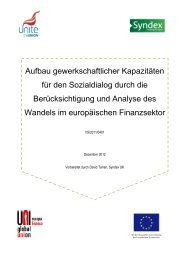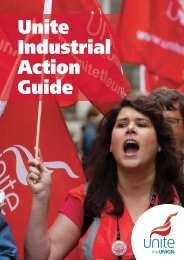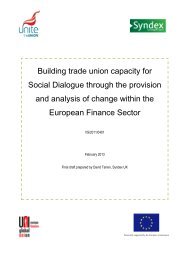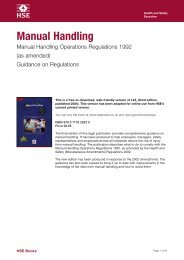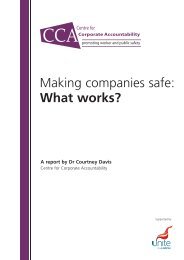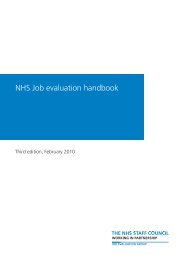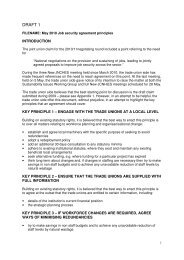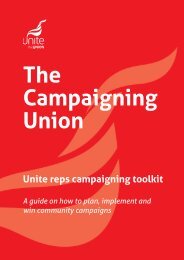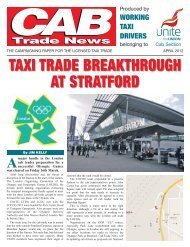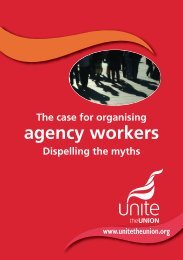Sustainable Transport and the Environment Guide - Unite the Union
Sustainable Transport and the Environment Guide - Unite the Union
Sustainable Transport and the Environment Guide - Unite the Union
You also want an ePaper? Increase the reach of your titles
YUMPU automatically turns print PDFs into web optimized ePapers that Google loves.
taking action, would, he said, lead to a worldwide depression worse than <strong>the</strong> 1920s<br />
<strong>and</strong> two world wars put toge<strong>the</strong>r. These figures don’t even take into account <strong>the</strong><br />
human impact of climate change which is already causing food shortages, flooding<br />
<strong>and</strong> population migrations. The action <strong>the</strong> UK needs to take, according to <strong>the</strong> UN’s<br />
IPPCC (<strong>the</strong>ir climate scientists) is to cut CO 2 <strong>and</strong> o<strong>the</strong>r greenhouse gas emissions by<br />
about 5 per cent a year, every year, with real cuts starting within <strong>the</strong> next few years 2 .<br />
O<strong>the</strong>r environmental issues like air <strong>and</strong> sea pollution are important <strong>and</strong> affect <strong>the</strong><br />
health of humans <strong>and</strong> wildlife.<br />
The current globalised system is also socially unsustainable. Workers, manufactured<br />
goods, <strong>and</strong> food, have had to travel ever longer distances, often with damaging<br />
impacts on employment, working hours, wage levels, health <strong>and</strong> safety, <strong>and</strong> <strong>the</strong><br />
economic viability of communities <strong>and</strong> regions. At <strong>the</strong> same time, deregulation <strong>and</strong><br />
privatisation has reduced affordable, publicly owned, energy-efficient transport<br />
options such as buses <strong>and</strong> rail. Lastly, our over-reliance on fossil fuel energy from<br />
unstable regions fuels conflict in those regions, as well as damaging <strong>the</strong> planet.<br />
For us, as trade unionists within <strong>the</strong> main transport trade union, <strong>the</strong>re is an opportunity<br />
as well as a risk, if we are willing to engage with <strong>the</strong> issues seriously. What kind of<br />
society do we want? What will be its transport needs, <strong>and</strong> how will <strong>the</strong>y be met?<br />
What impact will that have on those currently working in <strong>the</strong> transport industry, on all<br />
our union’s members, on all working people? This document does not pretend to have<br />
all <strong>the</strong> answers but it is hoped it will help stimulate debate.<br />
Technological solutions, whilst important, are not <strong>the</strong> main way that our mounting<br />
social <strong>and</strong> environmental problems are going to be solved. The scale of <strong>the</strong> problems<br />
is too large <strong>and</strong> it is extremely unlikely that scientists will achieve enough huge<br />
breakthroughs in <strong>the</strong> time available. Social, political <strong>and</strong> economic change will also<br />
be necessary – indeed, inevitable.<br />
In <strong>the</strong> future, a sustainable transport system will have to be based on a fairer<br />
distribution of costs, on stronger local economies, <strong>and</strong> thus on shorter transport<br />
distances. This is not so much a technical as a fundamental systemic change. Gordon<br />
Brown has called climate change “<strong>the</strong> greatest market failure in history” <strong>and</strong> it is clear<br />
that solutions to this serious problem cannot be left to <strong>the</strong> market. Everyone should<br />
have <strong>the</strong> right to work in a way that provides for <strong>the</strong>ir needs without damaging <strong>the</strong>ir<br />
environment, <strong>the</strong> sustainability of <strong>the</strong> planet, or of future generations.<br />
2.3. Impacts<br />
Sustainability <strong>and</strong> social impacts – especially working time<br />
As <strong>the</strong> ETF’s TRUST report says – ‘A fast growing sector that is based on poor<br />
quality jobs is nei<strong>the</strong>r socially nor environmentally sustainable’. The report goes on<br />
to say, ‘it might be an illusion that in transport it is possible to put economic<br />
sustainability (competitiveness) at <strong>the</strong> same footing with environmental <strong>and</strong> social<br />
2 IPCC Fourth Assessment Report – Climate Change 2007<br />
12


